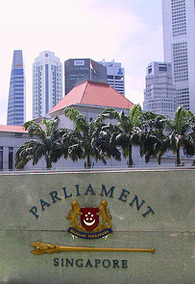This Saturday marks the end of the month-long period members of the public has to give their feedback on the major amendments proposed to the Penal Code - Singapore's primary criminal legislation - looks to decriminalise oral and anal sex between consenting heterosexual adults, but not between homosexuals.

A significant number of amendments are being proposed to the sections related to 'Sexual Offences'. The proposed amendments - detailed in a public consultation paper after a comprehensive review has been conducted over several years - was made available to the public since Nov 9. The amendments will be tabled to Parliament early next year.
Section 377 of the Penal Code which "criminalises all forms of carnal intercourse against the order of nature, other than vaginal intercourse" will be rescoped such that anal and oral sex, if done in private between a consenting adult heterosexual couple aged 16 years old and above, would no longer be criminalised, the paper said.
When the proposed amendments were announced last month, the Ministry of Home Affairs (MHA) explained that s377A would remain unchanged because "Singapore remains, by and large, a conservative society" and "many do not tolerate homosexuality."
Section 377A provides for a jail sentence for up to two years should a man is found to have committed an act of "gross indecency" with another man.
Singapore adopted the Indian Penal Code in 1871 when the citystate was then part of the Straits Settlements which was part of the British Empire. Britain, the former British colony of Hong Kong and Australia have since repealed laws prohibiting sex between men in 1967, 1991 and 1997 (in the state of Tasmania, the last Australian state to do so) respectively. In Asia, only Malaysia and India, both of which are former British colonies, continue to criminalise sex between men.
In an explanatory note issued on Nov 7 by the MHA, a public assurance was made that although the law on "gross indecency" between males will be retained, the authorities "will not be proactive in enforcing the section against adult males engaging in consensual sex with each other in private."
Gay advocacy group People Like Us (PLU) however does not see that a consolation, it said in a statement issued Nov 8: "such assurance does not have the weight of law; it is therefore unsatisfactory and legally, cannot be relied upon."
"We recognise that non-use has been a policy for some time now. Indeed, People Like Us knows of no prosecution involving adult consensual situations in recent years, but non-use argues for its repeal, not its retention, since it plainly demonstrates that Singapore society does not need to go around prosecuting gay men."
A number of non-governmental groups in Singapore such as Action for AIDS, Association of Women for Action and Research (AWARE), and Free Community Church as well as PLU have called for both Sections 377 and 377A of the Penal Code to be repealed completely.
In a press statement issued on Nov 7, PLU noted "the highly discriminatory intent of this proposed amendment, decriminalising anal and oral sex for heterosexuals, but leaving it unchanged for gay, lesbian, bisexual and transsexual (GLBT) persons" and "(s)uch state-led discrimination reinforces prejudice and homophobia in society, to the detriment of Singapore."
"Consensual same-sex relationships do not create victims; it is unsound to have laws over private lives where no injury can be demonstrated. The fact that the State has desisted from entrapment and prosecution in recent years is implicit acknowledgement of this principle."
At the Singapore Aids Conference held last Saturday on Dec 2, president of Action for Aids Dr Roy Chan called for the repeal of s377A from a public health perspective during his opening address.
Stressing the need to remove the biggest stumbling blocks in Singapore's fight against HIV/Aids, and stigma and discrimination, he said: "This legal barrier has made it impossible to target MSM (men having sex with men), and made us unable to address it within schools."
"It is the main reason for stigma and pushes (the issue) into the closet. It is not surprising that more young gay men are getting infected."
"It is a criminal offence so you can't talk about it. Simply saying, 'it's illegal, don't do it, full stop' does not solve the problem but rather worsens it," Dr Chan added.
The Association of Women for Action and Research (AWARE) , a social service organisation and an activist empowerment group, is also behind the call to repeal s377A.
"There is no reason to discriminate against a person based on race, religion, gender, marital status or sexuality. How consenting adults choose to express their sexuality in private should not be a concern of the state. The government has been saying that Singapore society is mature enough to be able to have two integrated resorts, therefore we should be mature enough not to pry into the intimate behaviours of consenting adults." Said Tan Joo Hymn, president of AWARE.
Although officials have frequently cited the sensitivities of some religious groups as the reason for retaining s377A, a church in Singapore has written a position paper which advocates the "total repeal of s377A and decriminalisation of all consensual sex between persons above the age of 16, regardless of their sexual orientation or preference" as well as the "total abolition of the marital immunity currently awarded to man who engages in non-consensual sex with his wife."
The paper will be published on www.freecomchurch.org later this week.
The Free Community Church (FCC) is the only church in Singapore to have a gay-affirming ministry for LGBT Christians called Safehaven.
When contacted by Fridae, Susan Tang the chairperson of FCC said that her church has taken a "position on the proposed amendments to the Penal Code, in particular that of s377a and s375 (marital immunity) because both do not provide protection for the weaker minority in society, and the retention of s377a further discriminates against homosexual men and infringes their constitutional rights of freedom of expression."
"As our church affirms that all individuals are persons of sacred worth and created in God's image, we accept and affirm all people regardless of race, religion, social or economic status, gender or sexual orientation. And as such we oppose the discrimination that gay persons still face in society today."
The 50-year-old mother of three teenagers believes that "all members of society who believe in respect, acceptance, justice and equality for all should be personally disturbed by the injustice, prejudices and discrimination underlying these proposed amendments."
"For these reasons, we would encourage concerned Singaporeans to register their disagreement with the government."
According to Fridae, Asia's largest gay and lesbian network, Singapore has an estimated 200,000 to 250,000 adult gays and lesbians.
Readers have till 9am on Dec 9 to write through Reach.gov.sg regarding the proposed amendments to the Penal Code. Everyone is strongly encouraged to voice their opinion. Readers may also use a template available on the following page while writing in.
Free Community Church's and AWARE's position papers can be read by clicking:
- Cover letter (PDF) and Position paper by FCC (PDF)
- Position paper by AWARE (PDF)
Readers have till 9am on Dec 9 to write through Reach.gov.sg regarding the proposed amendments to the Penal Code. Everyone is strongly encouraged to voice their opinion. Readers may use the following as a template.

Dear Sirs,
SUBMISSION ON THE PROPOSED PENAL CODE AMENDMENTS
In response to the Ministry's request for public comments to the Consultation Paper on the Proposed Penal Code Amendments, I advocate the following:
1. Total repeal of s377A and decriminalization of all consensual sex between persons above the age of 16, regardless of their sexual orientation or preference; and
2. Total abolition of the marital immunity currently awarded to man who engages in non-consensual sex with his wife.
Whilst heartened by the respect which the government is showing towards human rights in many of the amendments, the introduction of laws to protect the young and the weak, and the restrain in increasing imprisonment and caning for penalty, we are also concerned by the government's discrimination against homosexual men, showing a lack of respect for their constitutional and human rights.
By decriminalizing anal and oral sex between heterosexuals even for individuals as young as sixteen years of age, but retaining the provision on acts of sexual intimacy between men even when the acts are consensual and between adults, a significant portion of Singaporeans are being treated unequally. The privacy of heterosexuals and lesbians are respected but not gay men. They are deprived of their fundamental right to freely express their love for someone of their choice. The right to stand equal before the law and freedom of expression are an inherent dignity and inalienable right of humankind.
This position lies on the effect that it will have on the status, moral citizenship and sense of self-worth for an individual and a significant portion of the community. I believe that the amendment as its stands, associating gay sex with necrophilia and bestiality not only serves no purpose but is destructive to an individual and the community. It does not foster greater understanding and integration of gay men, who are often responsible, upright and contributing members of society in Singapore.
On the provisions concerning marital rape, I feel that the current partial abolition on conjugal immunity does not adequately protect potential victims.
I hereby also endorse the memorandum submitted by the Free Community Church regarding the repeal of s377A and the abolition of marital immunity currently awarded to a man who engages in non-consensual sex with his wife.
Yours faithfully,
